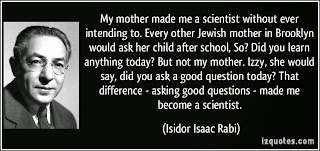Wednesday, September 10, 2014
Blog Assignment #4
The Right Way to Ask Questions in the Classroom
Ben Johnson makes a great point in calling the question "Does everyone understand?" useless. Rarely will students ever admit to not understanding a concept, especially if no one else admits to not understanding either. No educator, worth his or her salt, would move on from a concept with a simple assurance from students that they understand. Educators ask questions of students to check for understanding. Asking these types of questions is a valuable tool for an educator to ascertain how well the students are grasping the knowledge presented before them. Another Strong point made by Johnson is that students tend to shut down if a question is directed at another student or if there are perpetual "always answers the questions" students present in the class. Educators must find a way to keep ALL students engaged in the class. He mentions the questioning strategies of Mary Budd Rowe, which seem to be useful eliminate the problems mentioned above.
Asking Questions to Improve Learning
This article is from The Teaching Center and covers strategies for asking good questions. The strategy I found to be the most helpful was the "avoid asking leading questions" one. I have always found open-ended questions to be the most thought provoking. A leading question doesn't leave much room for the student to explore their own thoughts.
Three Ways to Ask a Better Question
Dr. Maryellen Weimer wrote this blog. It's a pretty simple formula she has suggested. Prepare questions, play with questions, and preserve good questions. This is probably what most of us have been doing to start with, but never quantified as such. You should always prepare your questions beforehand. You should revise or "play" with the questions, so that they maximize potential in the classroom. You should always keep good questions to use again when the subject comes back around. If you are conscious of being a good questionnaire, then this is probably a system you were already using, maybe even subconsciously.
Our Main focus as educators is to ensure our students understand the material we have been charged with teaching them. The best way for us to quantify their understanding is through examination. This is why we have tests, assign papers, give quizzes, etc. A questions is the most basic form of examination. The thing we need to know about asking questions to be a good teacher is what is the best question to ask to give our students the best possibility of exploring their own unique thoughts. We must formulate questions that drive students to think beyond the knowledge they heard in a lecture or read in a textbook. We must educate ourselves on how to ask the right questions to do just that.
Subscribe to:
Post Comments (Atom)


Hi Kyle! Your blog was very thorough and interesting to read! Your summary on the article by Johnson really captured the point he was stating. I totally agree with your statement about educators main focus should be to ensure that their students have a deep understanding of the material being taught. By any form, whether on tests or projects like in the class, educators must get a measurement of what a student knows. Asking the right questions to students is truly a strategy every teacher should adopt. Your quote picture was great. Have a great semester!
ReplyDeleteAwesome job!
ReplyDelete